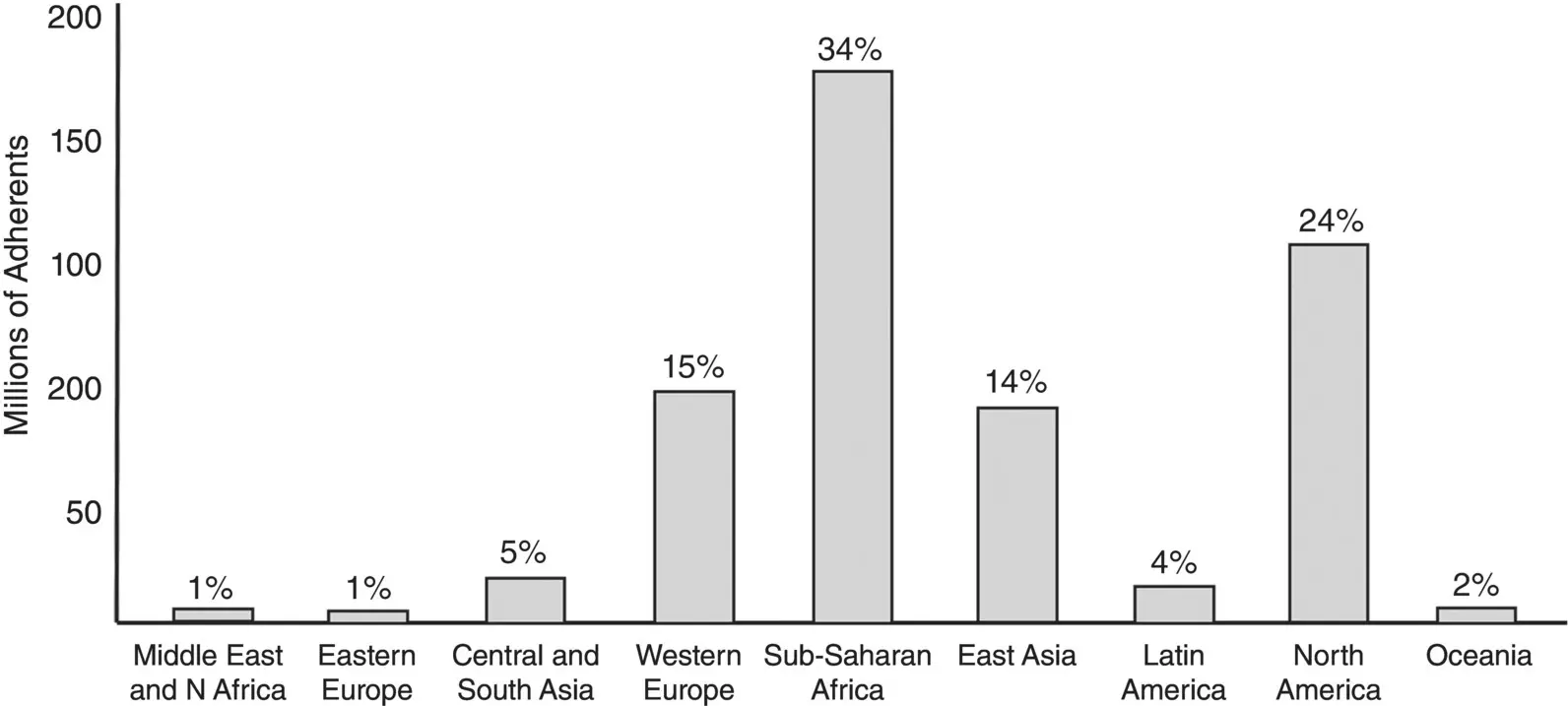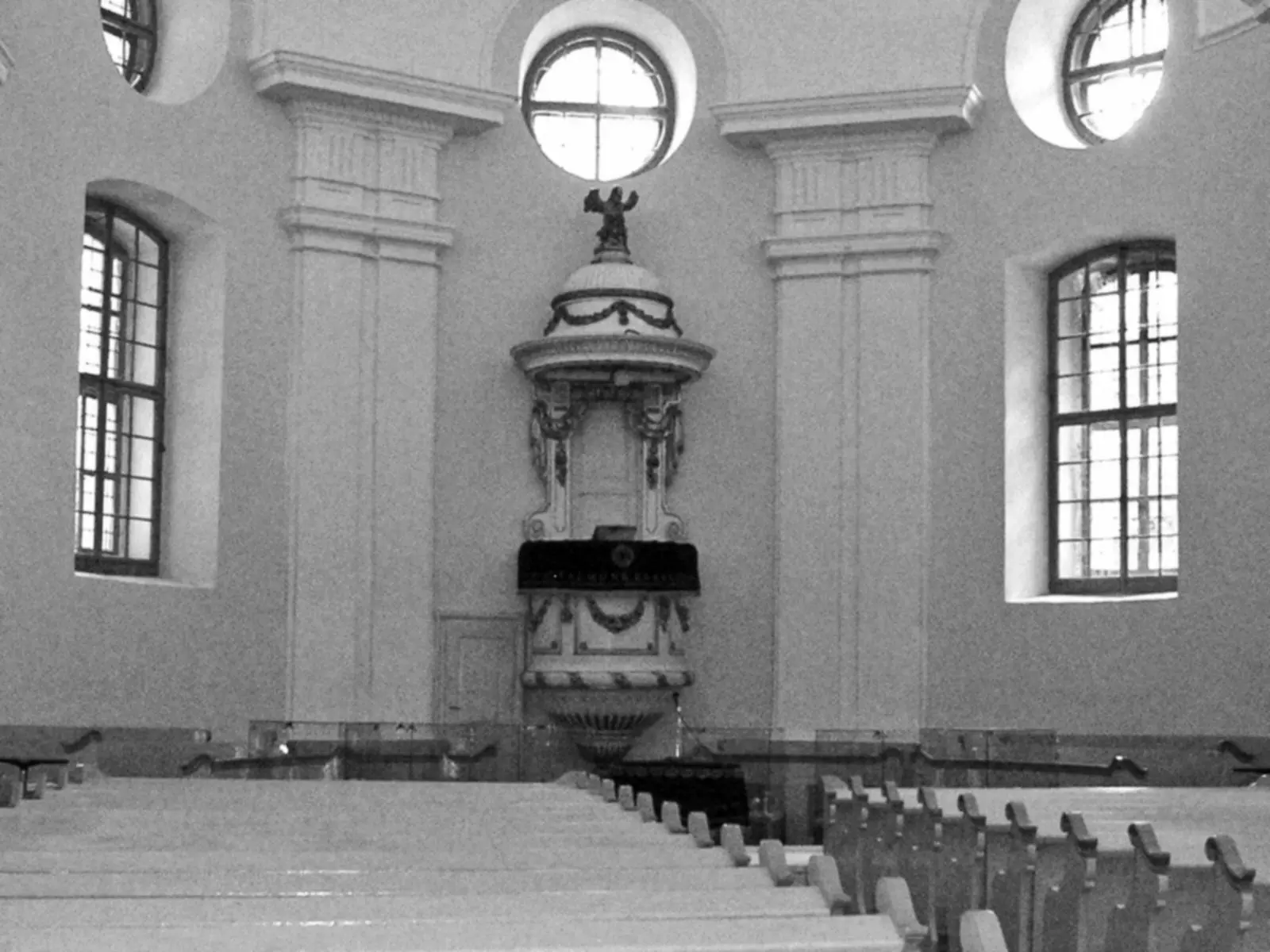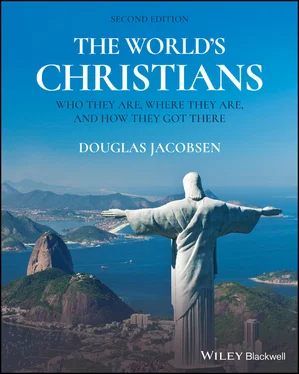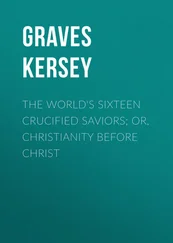Protestants do not generally call themselves Protestant in the same way that Catholics call themselves Catholic and that Orthodox Christians call themselves Orthodox. If asked to describe themselves religiously, most Protestants identify themselves either by the name of their particular Protestant sub‐tradition (such as Anglican, Baptist or Lutheran) or they simply say they are Christian. This is so much the case that in certain parts of the world – in both the United States and China, for example – saying you are a “Christian” implies that you are Protestant rather than Catholic. Nevertheless, the term “Protestant” is an apt description of the movement as a whole. On the one hand, it can mean “to protest,” and the name was applied to the original Protestant reformers partly because they protested certain Catholic attitudes and actions. But the word Protestant can also mean “to profess” or “to confess” what one believes to be true, a more positive definition that points toward the core emphasis of the movement. A common synonym for Protestant in many parts of the world is “evangelical,” meaning “of the gospel” or “good news.” Thus Protestants in Germany, the birthplace of the movement, go by the name Evangelische and in Latin America Protestants are known as evangelicos . (The term “evangelical” can sometimes be confusing, however, because in places like the United States and Great Britain calling oneself an “evangelical Christian” or “an evangelical” is meant to signal that you are a particular kind of conservative Protestant.)

Figure 3.1 Number of Protestant Christians living in each region of the world with percentage of all Protestants worldwide.
© John Wiley & Sons, Inc.
The Protestant tradition began in Europe, and most of Northern Europe remains solidly Protestant today, but the demographic center of the movement is now Sub‐Saharan Africa with North America in second place. Protestantism is also gaining ground in East Asia (especially in China), but it remains a very small movement in Latin America, Eastern Europe, and the Middle East (see Figure 3.1).
Protestant spirituality is centered on and grounded in the Bible. Protestants frequently refer to the Bible as the Word of God (with a capital “W”), and they expect God to speak to them through that Word. This was the experience of Martin Luther, who read the biblical words “the just shall live by faith,” and it turned his life upside down, freeing him from anxiety about his moral failures and God’s judgment. In the twentieth century, that same focus on the words of the Bible energized the ministry of Billy Graham, the conservative American Protestant who was the century’s best known and most widely traveled preacher. In his sermons and other public comments, Graham never tired of repeating the phrase “the Bible says.” The centrality of the Bible is also echoed in the words used by pastors in the United Church of Christ (one of the most progressive Protestant denominations in the world) when they introduce the reading of the Bible in Sunday worship with the words “God is still speaking.”
For Protestants, reading the Bible is a spiritual discipline undertaken for the purpose of keeping one’s vision of the gospel fresh and vibrant. Protestants want people to read the Bible for themselves and therefore the translation of the Bible has been a major priority. Largely due to Protestant efforts, the Bible has now been fully translated into more than 650 languages and has been partly translated into 2,000 more. But it is not just the ability to read the Bible that matters for Protestants; they also put great emphasis on the “right of private interpretation,” the right of individuals to read the Bible and decipher its meaning for themselves. This was and still is a revolutionary concept, and in recent years Christians around the world have invoked this Protestant principle of interpretation to support and defend many different readings of the Bible.
While Protestants strongly affirm the right of individuals to interpret the Bible for themselves, they do not believe all interpretations of the Bible are equally valid. Like everyone else, Protestants have opinions, and they believe that some interpretations (and their corresponding theologies) are decidedly better than others. In fact, most of the major divisions that exist within Protestantism can be viewed as groups who share a specific interpretation of the Bible. Baptists read the Bible one way, Presbyterians emphasize something else, Lutherans have yet another take on what the Bible means, and so forth. But in almost all these churches, even the most doctrinaire, some room is left for individuals to interpret the Bible for themselves.
At the level of the congregation, most Protestants view their pastor as the chief interpreter of the Bible for their group, and most Protestant pastors view preaching as their most important responsibility. Protestant denominations generally require their pastors to be trained at an approved seminary, and seminary education has typically included proficiency in Greek and Hebrew so the Bible can be read in its original languages. The bookshelves of Protestant ministers are often filled with scholarly biblical commentaries and thick theological treatises. All this knowledge and training gets funneled into the sermon, where the pastor explains the Bible’s message and its applicability for today. The architectural placement of the pulpit in Protestant churches – usually front and center – reinforces the importance of the sermon in Protestant worship (see Figure 3.2). Here again, however, individuals reserve the right to read and interpret the Bible for themselves. Protestant laypeople listen to their pastors, but if they disagree with what their pastors say they usually feel quite free to ignore or challenge them.
While there is a great deal of interpretive freedom within the Protestant tradition, almost all Protestant churches affirm five distinctively Protestant beliefs. First, Protestants affirm that salvation comes from God alone and that human effort cannot change an individual’s standing with God. Second, Protestants affirm that faith or trust in God is the core of religious life. Third, Protestants see the church as a fellowship of believers rather than as the dispenser of God’s grace. Fourth, Protestants believe in the “priesthood of all believers” and assume there is no difference in the spiritual status of ordained ministers and laypeople (even if they acknowledge functional differences). Finally, Protestants believe that every person and every human institution, including the church, is flawed and fallible and perpetually in need of correction. Perfection will only be attained in heaven.

Figure 3.2 Interior of Reformed Church (Sibiu, Romania) illustrating the architectural centrality of the pulpit.
Photo by author.
The idea of “vocation” is another key emphasis within Protestant spirituality. To have a vocation is to be called by God to a specific kind of work in the world. This work can take many different forms. Some vocations are explicitly religious, like becoming a pastor, but other vocations can look quite “secular,” at least on the surface. Protestants believe that God can call people to become artists, teachers, police officers, stay‐at‐home parents, accountants, or politicians in addition to calling some people to be pastors. What makes this work a vocation, rather than simply being a job, is doing it in God’s name and out of a religious sense of service to others. This is a very different understanding of vocation than is common within the Catholic tradition. Catholics generally apply the term vocation only to becoming a priest or a religious sister or brother. By contrast, Protestants believe that everyone can have a vocation or calling from God regardless of the kind of work they do.
Читать дальше














